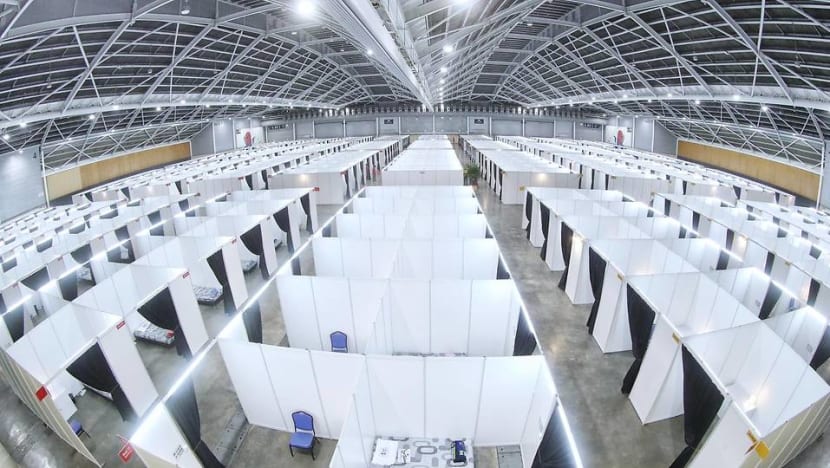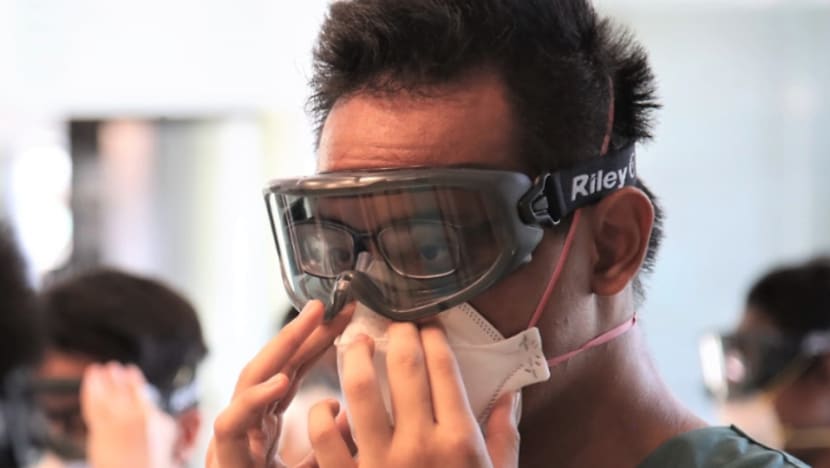Singapore looking for venues to house future contingency care facilities during public health crises
This comes as existing isolation and quarantine facilities are approaching the end of their contracts, including one at the Singapore EXPO which ends next year.


This audio is generated by an AI tool.
It comes as existing isolation and quarantine facilities are approaching the end of their contracts, including one at the Singapore EXPO which ends next year.
CNA has seen documents that show the Ministry of Health (MOH) seeking information from venue providers that can be called upon as contingency community facilities.
REPURPOSING VENUES AS HEALTHCARE FACILITIES
MOH told CNA that such facilities may be set up at pre-identified venues to provide care for those undergoing isolation or quarantine orders, as well as those who are generally well but unable to safely isolate at home.
“Our plans also include readiness to stand up non-accommodation healthcare facilities, such as vaccination and disease testing sites,” MOH added.
When COVID-19 hit Singapore in 2020, places from hotels to convention centres were repurposed to treat patients and quarantine close contacts.
“One of the main issues with a major epidemic – and of course that includes a pandemic like COVID-19 – is … a surge in cases which will be more than the hospital capacity in any country, including Singapore,” said Dr Hsu Li Yang, vice dean of global health and programme leader of infectious diseases at the National University of Singapore’s Saw Swee Hock School of Public Health.
“Because the number of hospitals are fixed and they cannot just be easily increased within a few days or weeks.”
The lodging sought by MOH includes individual rooms, group bookings of multiple rooms, or the option to reserve an entire premises. This will support the contingency requirements.
These lodgings must be on standby from this or next year depending on their type, for a period of between two and three years during a national crisis or public health situation.
All interested venues must also provide meals.
MOH did not share which lodging providers have signed up so far, but observers said there would be some usual candidates.
“Clearly, hotels would work the best. They are suited for that purpose because each room can house a certain number of people,” said Dr Hsu.
“Other facilities like sports complexes, those would need a certain amount of engineering or redesign to be able to suit the purpose.
“Technically, any facility can be converted. It's just the effort that's needed.”

ENLISTING HOTELS, CHALETS IN FIGHT AGAINST COVID-19
Observers said it will be up to MOH to work with venues to iron out the requirements, such as getting proper ventilation.
“It's important to keep in mind that there should be a specific design for such facilities so that they can be dual use,” said Dr Hsu.
“I think for housing patients, even mild patients in a pandemic, the key thing is that there shouldn't be a risk of transmitting the disease to others within the facility or even outside the facility.
“That requires a certain kind of design in the airflow, air exchange, and the ease of which infection prevention can be done, as well as the monitoring of patients there,” added Dr Hsu.
When Singapore was battling COVID-19 in 2020, hotels were the first places to be used to isolate close contacts and incoming travellers on stay-home notices. By 2021, more than 90 hotels were involved.
Chalets, meanwhile, were mostly designated as quarantine facilities.
As the virus spread rapidly, hospitals struggled with the influx of patients. Large venues such as the F1 Pit Building were also converted into community care or treatment facilities.
The Singapore EXPO, which was among the venues converted in 2020, said it is ready to lend a hand if another crisis hits.
During the height of the pandemic, halls there were used as treatment facilities for patients. MOH then continued to tap them as transitional care facilities.
These halls will be returned to the venue’s management to host more events starting from next year. It will no longer need to be a community facility from mid-2025 onwards.
At its peak, the convention centre accommodated about 8,000 beds.
“Our involvement in the national pandemic efforts has helped us gain insights into how we continue to make sure that our infrastructure is adaptable, so that in future (when there are) such needs, we will be ready and we will stay agile,” said Mr Ng Sim Lim, vice president of sales at trade show and exhibition organiser Constellar, which manages the Singapore EXPO.
EXPO LOOKING TO HOST MORE MICE EVENTS
Before the pandemic, Singapore’s largest MICE (meetings, incentives, conferences, and exhibitions) venue hosted about 600 events and 6 million visitors each year.
“We have already seen utilisation rate that's recovering back to very much the pre-pandemic levels, and it's only a matter of time that we believe we'll do a full recovery,” said Mr Ng.
The EXPO hosted around 220 events in 2022, and 330 in 2023.
In hopes of attracting larger events, it is tapping in-built amenities so organisers can set up quickly and save money.
It has already hosted this year's Food and Hotel Asia convention, using all available eight halls.
With another two halls to be returned next year, the entire venue will be booked by the International Textile Machinery Association exhibition.
For music lovers, Hall 7 has been refurbished as a dedicated concert venue for more than 6,000 people. It previously housed the Connect @ Changi facility for business travellers to meet safely during the pandemic.
“What we have seen is a lot of strong demand for mid-sized concert arenas,” said Mr Ng, adding that there are not many entertainment venues that can cater for between 3,000 and 6,000 people.
“From the start of the year, we have already welcomed many events. I think these are your emerging artists who are really trying to build their fanbase here. So we’ll be looking at your Korean bands.
“We're looking at some of the other artists who are coming through in the later part of the year. So we'll be welcoming (Icelandic singer) Laufey in September, as well as more big artists that will be announced very soon.”
The EXPO’s next plans are to convert three other halls to be more entertainment-focused.


















